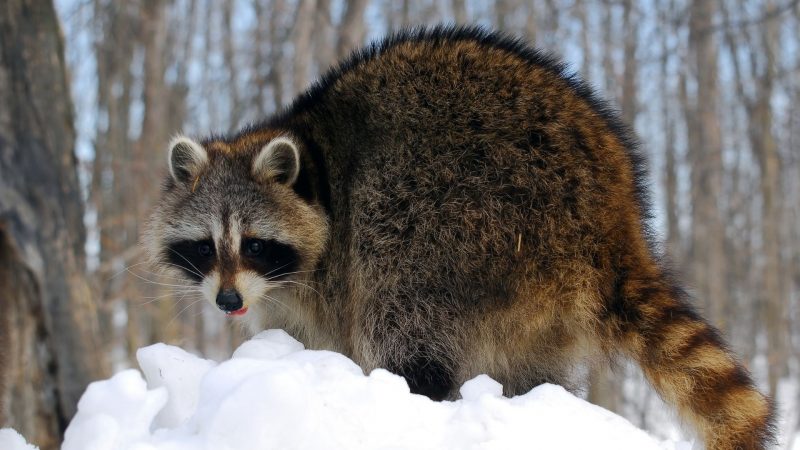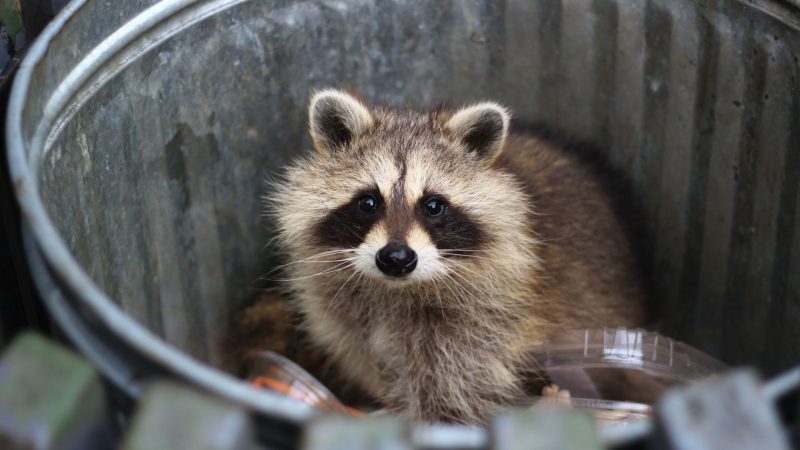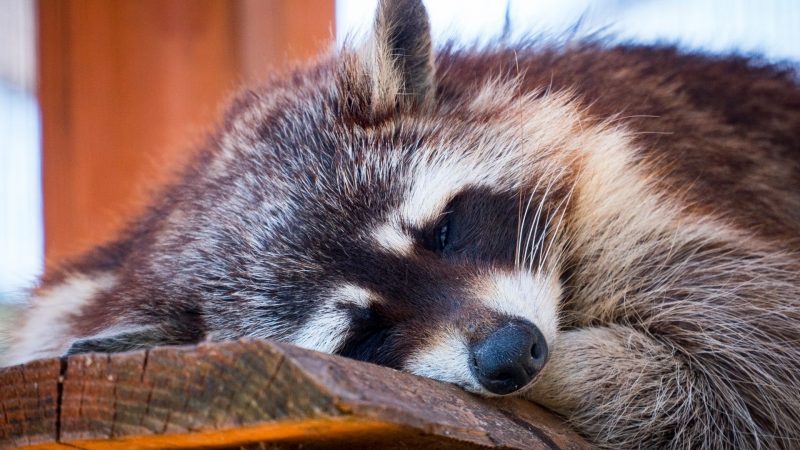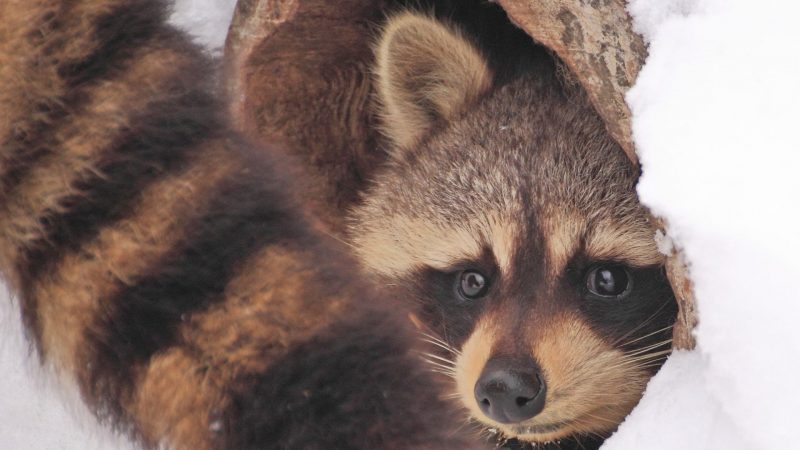Some animals hibernate for the winter, sleeping through nearly the whole of the season. It is due to the fact that their body temperature drops. During this peaceful period, their breathing and heart rate both slow down.
Animals hibernate during the winter because food is scarce and would go back once food becomes readily available for them.
Do raccoons hibernate? However, raccoons don’t actually hibernate, but they do lower their activity in the winter. They save up food and prepare for cold weather by gathering as many fat reserves to get through tough times of scarce resources. The raccoon’s coat also gets thicker during this time so that it can withstand the harsh winters.
This post will explore whether or not raccoons do indeed hibernate and what this means for them.
What Would Raccoons Do for Winter?

The raccoon’s habits are a perfect example of the phrase “Winter is coming.” They start preparing for cold weather as soon as it starts getting colder. It means that they eat more and gain weight to prepare, as evidenced by their body fat nearly doubling before winter arrives (14-15%).
When winter finally does hit, these animals also enter into hibernation mode. It is when Long periods of sleep help them conserve energy from food sources during this season when food isn’t much available.
During cold winter nights, raccoons often find themselves next to each other in a den for warmth. They will separate once the temperature starts climbing again and they are no longer as needy of heat.
When raccoons mate in mid-January, they have a typical gestation period of roughly 65 days and nurse their babies during the winter. Because of this, garages or attics that are generally warm can become very inviting to these opportunistic animals.
It then gives a double benefit of an already prepared space coupled with proximity to food that may attract them into your home on colder nights.
Raccoon’s Behavioral Changes During Hibernation Season

Sleeping Habits
For the most part, raccoons are nocturnal creatures. They know people’s habits and work them to their advantage. They normally sleep during the day, so you are unable to find them. But they’re still bound by a natural cycle that humans go through as well – the sleep-wake process.
Raccoons can be found napping in many different places. If you happen to have some trees or bushes near your house, then raccoons will be there before sunrise for one more nap. When evening comes around again, they find themselves going for another round of nocturnal activity.
Behavioral Adaptations
Raccoons have a few different ways to survive winter while food is scarce and cold weather makes hunting difficult. These omnivores live off of their fat stores for long periods during these times while they sleep in dens.
Raccoons are flexible animals with many housing options. They will move into tree hollows, deserted attics if available, woodchuck burrows, and even caves.
Dietary Adaptations
Raccoons are scavengers. They will eat whatever food is available through their primary diet consisting of fruits, vegetables, and seeds. However, if small vertebrate prey items like crayfish or insects become prevalent, they also consume these in large quantities.
They are notorious for their dumpster dives, and in the winter, they show no signs of slowing down. The less food available to them, the more likely your garbage will be a tempting target. They might even make efforts to sneak into garages or other areas with easy access to avoid missing out on any opportunities.
Moreover, the raccoon’s tactile sensory systems are most important to a nocturnal search for food. It relies on its sensitive front paws, which are often confused as being washing behavior in nature. The word “lotor” from its scientific name, Procyon lotor, actually means “washing” in Latin. Hence the strong association.
Predator Protection
Apart from their behavioral adaptations, they also have a strong will to live and are capable of fighting off animals two times their size. Their nocturnal lifestyle is one way they can avoid many predators. But this also comes with the cost of less prominent eyesight that leaves them vulnerable in certain circumstances.
Is Hibernation a Thing for Raccoons?

In North America, raccoons are common animals that people quite marvel to see them sleep through winter. They enter this torpid state when temperatures fall below 15 degrees Fahrenheit. So they often retreat into their dens made out of trees or subterranean spaces for safety from predators.
Their interesting adaptation for survival is known to be a torpor. Torpor allows raccoons to sleep at times of the year when they would need more energy, like in wintertime or during a cold snap.
In this hibernation state, their body temperature lowers, and insulin increases, so that blood sugar levels are controlled appropriately. When it gets warmer outside again, they will emerge from their den to do food searching but will always come back after looking around.
Because of this, they can sleep like a baby in the cold. These mammals grow an additional layer of fat during the winter months to help them prepare for hibernation. Their fur also gets thicker, so they can stay warm throughout the season without even having to move much.
Where Do Raccoons Stay During Winter?

When life is hard, the masked troublemaker of the forest can be found in its den. And when winter comes, it will sleep lightly. But when temperatures and weather improve, they will be looking for food or anything to feed their hungry mouths.
Normally, raccoons are solitary animals with home territories that they’ll defend from the competition. However, during winter months, when it’s cold out and their natural habitats aren’t as warm or protective against predators, they often den together to conserve body heat better.
It is especially true if there’s enough space in your backyard, such as trees, for them to climb up safely away from other animal intruders.
Furthermore, they are usually alone in a burrow or with babies from last year. Raccoon’s lifespan varies depending on how well they survive. Some have been known to make up 12 years before passing away, while others only manage two at best (if all goes right).
How to Prevent Home Damage Caused by Raccoons?
Raccoons are curious animals that, at times, can cause problems with humans. As a result, some people labeled them as mischievous bandits who steal from trashcans or attempt to break into homes searching for food scraps.
Here are some ways you can stray raccoons away from your home:
Do Not Give Raccoons Food to Eat
Feeding raccoons is not advisable because it can create dangerous situations for you and your loved ones. These wild animals are unpredictable when they don’t get what they want, especially if that’s food from humans.
Take the Garbage Out of Raccoon’s Site
Having a clean environment is the key to a healthy home and neighborhood. It’s important to keep your trash off the ground and in sealed plastic bags. Once you have a large enough garbage bag, take it directly to the dumpster so as not to create any litter.
Eliminate Entry Access for the Raccoons
Raccoons are a common nuisance in many areas. Prevent them from accessing rooftops by trimming tree limbs away from structures and attaching metal sheets flashing around corners of buildings.
Contact Raccoon Experts to Take Them Away
If you think your home is infested with raccoons, contact a professional who can help remove the pesky critters. They will make sure they won’t come back.
Related: What Scent Will Keep Raccoons Away? | Information & Facts
List of Sources
Living With Wildlife Raccoons. U.S. Department of Agriculture, Animal and Plant Health Inspection Service.
Learn About Raccoons. Commonwealth of Massachusetts.
Raccoons (Procyon Lotor). Washington Department of Fish and Wildlife.
Voyle, G. (2014). Winter Versus Raccoons, Skunks and Opossums. Michigan State University Extension.
- How to Get Rid of Copperheads | Practical Guide - August 27, 2023
- How to Get Rid of Corn Snakes | What Makes Them Aggressive? - August 27, 2023
- How to Get Rid of Alligators | Safety Measures and Removal Methods - July 16, 2023
